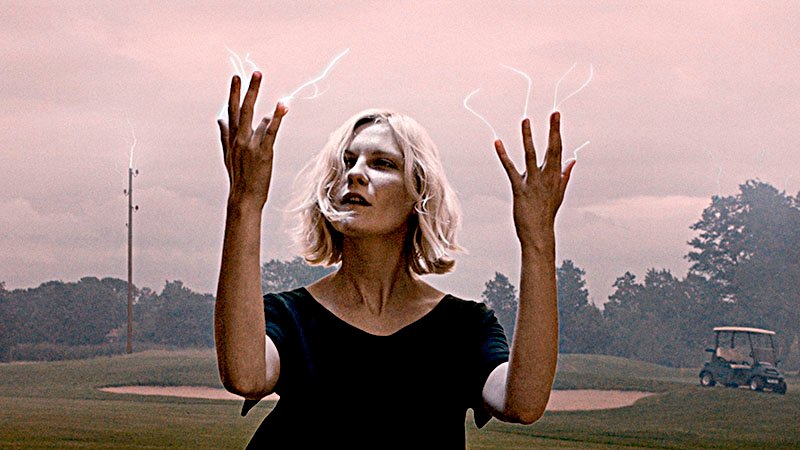
Kirsten Dunst in ‘Melancholia’.
Synopsis
If you get fed up with Melancholia in the first five minutes and decide to take a nap instead, I won’t try to convince you that you’ve made a mistake. Melancholia is the kind of movie you really have to want to see. Perhaps you’re a Lars von Trier junky, addicted to his bleak view of humanity and annoying … OK, artistic … jump-cut editing. Or maybe you want to marvel at Kirsten Dunst’s much-nominated performance. Or you’re a student who needs a work full of enough symbolism and arresting visuals to sustain a five-page essay for your film class. If you’re looking for any of those things, you’ll find it in Melancholia. If not, it’s going to be a long two hours.
So, about those first five minutes or so. It consists of a series of scenes featuring the main characters, shot in such extreme show-motion that at first you think they are stills. The images are surreal and tempt you to look deeper for clues about their meaning. And if they lasted only a few minutes, you’d be in the right emotional state of mind for what is to come. But they go on for more minutes than many of us will have patience for, to the point where you begin to fear that maybe you’re stuck in art movie hell, and this is all there is for another two hours. But they do eventually end, and as the film progresses you realize they were a sort of memory test, setting up themes you’re supposed to recognize as the movie progresses.
As for plot, there’s scant little of it to convey. The two halves of the narrative start with Justine (Kirsten Dunst), who’s pretending — but not very hard as the night wears on — to be having some fun at her wedding reception. But her new husband seems to be both very nice and very bland, her boss is a total ass, her mother is bitter and cold, and her father is an alcoholic buffoon. As the night wears on, she progresses from melancholy to despair, and in the days following into a profound depression.
And, oh yes. A planet named Melancholia is making a transit across the heavens, coming ever closer. This is not science fiction; scant little is said about its history. It is simply a very large and obvious metaphor, growing larger in the sky above.
The second timeline in the days after the wedding belongs to Claire (Charlotte Gainsbourg), Justine’s sister. Although Claire hates Justine for her self-destructiveness, she also nurses Justine through her worst days of depression, persevering in the onslaught of Justine’s relentless negativity. All the while, Claire is dealing with her own demons, compulsively following Internet stories about Melancholia. Her husband John (Kiefer Sutherland) says the rogue planet will pass by; doomsayers claim will it collide with the Earth, putting an end to us all.
Skip It
Dunst is really scarily good at playing the depressive Claire, who claims to know with infallible certainty that they all have only a short time to live. She travels seamlessly in the reception scenes from bemused and giggly to morose and sullen, lashing out with brutal honesty at her boss and inevitably at her new husband as well. The hollowness in her expression as she caves in to her depression is truly affecting. Gainsbourg is actually just as remarkable as the sister who hates her but also feeds and bathes her when she finally reaches near catatonia.
Nothing much “happens” in this movie, and you should not expect it to. Despite the tone you’re no doubt reading into this review, I ungrudgingly admit I found the performances worth watching and the visuals frequently beguiling. I was willing to overlook some sophomoric lines. (Just so you don’t miss his attitude toward humanity, Von Trier has Justine say “The Earth is evil; we don’t need to grieve for it; nobody will miss it.”) No doubt on a second or third viewing, I could even relate the movie’s initial slow-mo visuals with all the scenes that came afterward.
But I’ll move on for now. What I will admit is that Melancholia is the type of movie I admired more than I enjoyed. And if you can make it through the first five minutes, you might not be sorry you didn’t take that nap.